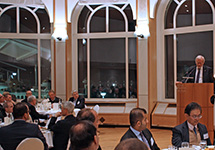Amanda Moodie
March 25, 2014
 On March 14-15, 2014, the James Martin Center for Nonproliferation Studies (CNS) hosted a two-day diplomatic workshop in Annecy, France on the Treaty on the Non-Proliferation of Nuclear Weapons (NPT).
On March 14-15, 2014, the James Martin Center for Nonproliferation Studies (CNS) hosted a two-day diplomatic workshop in Annecy, France on the Treaty on the Non-Proliferation of Nuclear Weapons (NPT).
The meeting, held in the run up to the annual Preparatory Committee (PrepCom) meeting for the 2015 Review Conference, was attended by a number of notable participants including Australian international policymaker and former politician Gareth Evans and Comprehensive Nuclear-Test-Ban Treaty Executive Secretary Dr. Lassina Zerbo, both of whom served as keynote speakers.
Despite the importance of preventing the spread of nuclear weapons to new states and terrorists, the success of this year’s NPT PrepCom is far from guaranteed. At last year’s prepcom, Egypt’s delegation walked out to protest the lack of progress on a convening a conference on the creation of a weapons of mass destruction free zone in the Middle East. The political situation in Ukraine and rising tensions between the United States and Russia also pose a serious threat to the outcome of the 2015 NPT conference. More recent attention to the humanitarian consequences of nuclear weapons on the part of many Non-Proliferation Treaty (NPT) member states – and the consternation from the treaty’s nuclear-weapon states over this particular line of discussion – also has the potential to deeply divide the treaty’s members and derail prospects for progress. Against this background, the Annecy workshop participants met to develop and share recommendations for this year’s PrepCom and consider what sort of PrepCom outcome might contribute to a successful 2015 Review Conference.
In his remarks to the conference dinner, Ambassador Evans focused on the priorities and challenges for the nuclear disarmament agenda, arguing that policymakers and scholars need to pursue a number of objectives in order to promote progress on the disarmament front. These include challenging Cold War assumptions about deterrence and the value of nuclear weapons; presenting a credible timeline for disarmament that acknowledges both geopolitical and technical obstacles; encouraging unilateral (as well as, to a lesser extent, bilateral and multilateral) stockpile reductions; advocating for a reduced role for nuclear weapons in national security policies within nuclear umbrella states as well as nuclear-armed states; and persuading the nuclear-weapon states to rethink their opposition to the humanitarian consequences movement. The following day, Dr. Zerbo offered his comments to a lunchtime gathering. His address focused on maintaining support for the entry into force of the Comprehensive Nuclear-Test-Ban Treaty and on the prospects for success, as well as the CTBTO Preparatory Commission’s current work.
The Annecy gathering also provided an opportunity for the PrepCom Chair-elect, Ambassador Enrique Roman-Morey of Peru, to consult with key ambassadors from NPT States Parties, senior staff members from the UN Office for Disarmament Affairs (ODA), and representatives from think tanks and other non-governmental organizations. Participants heard from Ambassador Roman-Morey about his vision for the PrepCom and proposed structure and timetable for the conference.
